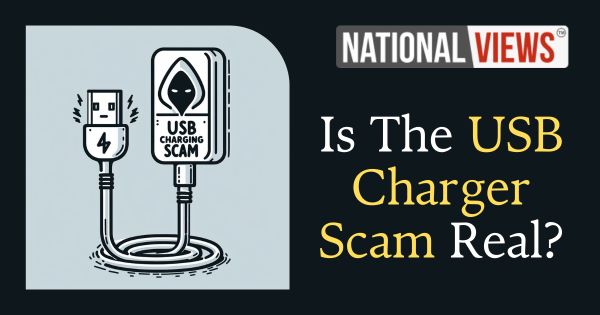Yes, the USB Charger Scam, also known as “juice jacking,” is a real threat! Cybercriminals exploit public USB charging stations in places like airports, hotels, and cafes to steal data or install malware on connected devices.
This scam involves hackers loading malware onto charging stations or cables left plugged in at these stations to infect the phones and electronic devices of unsuspecting users, potentially leading to data theft or device locking. (Source)
How Does This Scam Work? What is Juice Jacking
One more way the USB Charger Scam, or “juice jacking,” works is by hackers setting up fake charging stations or tampering with existing ones in public places like cafes and airports. Individuals who plug their devices into these compromised stations unknowingly expose their devices to malware or data theft.
This method allows scammers to gain access to personal information, install malicious software, or even remotely control connected devices, putting users at risk of financial loss and privacy breaches. (Source)
How to Save Yourself from USB Charger Scam in 2024
To protect yourself from scams like the USB Charger Scam, it’s essential to be cautious and follow some key steps:
Firstly, Avoid Public USB Charging Stations. Use your personal charger or a portable battery pack instead of public charging stations to prevent potential data theft or malware installation. Opt for wall plug-in sockets over public USB ports and consider using USB data blockers to prevent data transmission through the USB cord.
Secondly, be cautious of unsolicited messages, emails, or calls, especially from unknown sources. Avoid sharing personal information or engaging with strangers who request access to your devices. If something seems suspicious or too good to be true, take the time to verify the legitimacy of the situation. Don’t rush into making decisions or providing sensitive information.
Thirdly, turn on biometric identification like fingerprint or facial recognition on your devices to enhance security and prevent unauthorized access. (Source)
Types of Cybercrime Going on in India Currently
In India in 2024, Internet crimes are divided into three main categories:
1. Crimes against people:
These crimes include online harassment and stalking, distribution of pornography to children, credit card fraud, marketing to people, fraud, theft. and online defamation or slander.
2. Crime:
Some online crimes are committed against things such as computers or servers. These crimes include DDOS attacks, hacking, virus transmission, cybersquatting and typos, computer sabotage, copyright infringement, and intellectual property infringement.
3. Crimes against the state:
When cybercrime is committed against the state, it is considered an attack on the country. Cybercrimes against the government include hacking, accessing confidential information, cyber warfare, cyber terrorism, and pirated software. (Source)
Stay informed about common scams, their tactics, and how to recognize warning signs. Regularly review your financial transactions and report any suspicious activity promptly. By following these precautions and being mindful of potential risks, you can significantly reduce the chances of falling victim to scams like the USB Charger Scam.
Also Read: 6 Cybersecurity Tips for your Business


